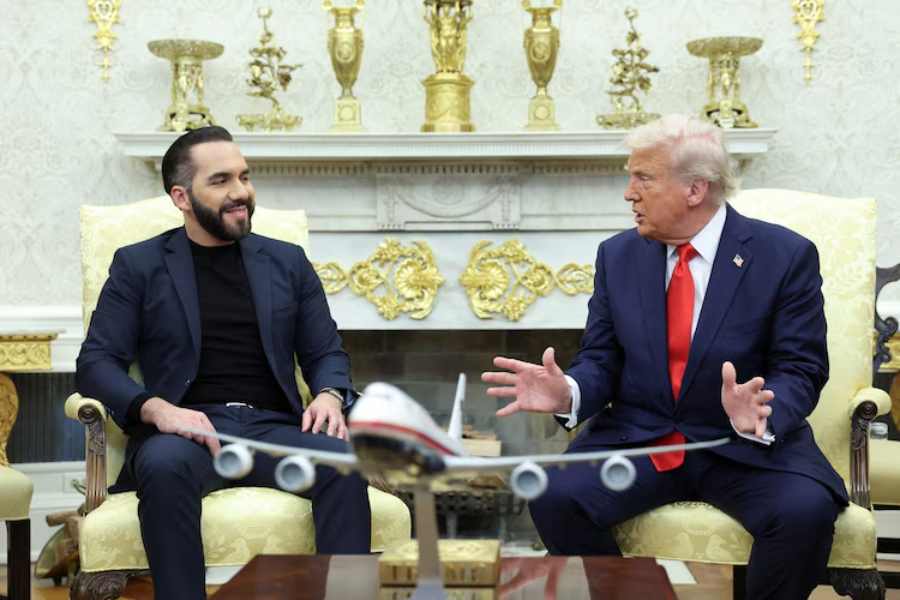In a dramatic Oval Office appearance, El Salvador’s President Nayib Bukele declared he will not return Kilmar Abrego García, a Maryland man who was wrongfully deported, despite a direct order from the U.S. Supreme Court. Sitting alongside former President Donald Trump, Bukele dismissed the notion, saying, “I don’t have the power to return him,” and called questions about his authority to act “preposterous.”
Kilmar Abrego García’s story has become a flashpoint in the immigration debate. A Salvadoran national who fled his home country in 2011 due to political violence, Abrego García had been living in Maryland under court protection. In 2019, a U.S. court issued a withholding order explicitly barring his deportation to El Salvador, citing the risk to his life.
Despite that ruling, Abrego García was removed from the U.S. in what officials later described as an “administrative error.” Upon arrival in El Salvador, he was sent straight to CECOT, the country’s harsh maximum-security prison reserved for gang members and the most dangerous criminals.
The Trump administration claims that Abrego García is a member of the MS-13 gang, labeling him a “terrorist”—a term Bukele echoed. However, no criminal charges have been filed against him, and no evidence of gang affiliation has been presented publicly. His attorney, Benjamin Osorio, argues that the claims are baseless and politically motivated. “They want to keep him there because bringing him back would expose the truth,” Osorio said.
Last week, the U.S. Supreme Court ruled that the federal government must facilitate Abrego García’s return, emphasizing that his deportation was illegal. The Court stated that the government must be ready to present updates and future plans to correct the wrongful removal.
Initially, Trump appeared willing to comply. “If the Supreme Court said bring somebody back, I would tell them to do that,” he said. But just days later, Trump reversed his stance, instead declaring that the responsibility lies with El Salvador. During Monday’s meeting, he refused to answer when pressed about his earlier statement, choosing instead to attack the reporter who posed the question.
Trump’s top officials have backed his new position. Attorney General Pam Bondi, Secretary of State Marco Rubio, and adviser Stephen Miller all claimed the matter is now solely in El Salvador’s hands. “This individual is a citizen of El Salvador. He was illegally in the United States and was returned to his country,” Rubio said. Bondi added, “It’s up to El Salvador if they want to return him.”
Miller further distorted the Court’s ruling, claiming the justices had unanimously decided that neither the President nor the Secretary of State could be compelled to retrieve Abrego García. In truth, the ruling acknowledged that the U.S. government broke the law by deporting him and must take steps to correct it.
Critics argue that Monday’s Oval Office meeting was a staged display of political posturing. Bukele, who once referred to himself as the “world’s coolest dictator,” seemed to revel in the moment. When asked about the possibility of returning Abrego García, he laughed off the idea, saying, “How could I smuggle a terrorist into the United States?”
Observers say the partnership between Trump and Bukele has emboldened increasingly hardline immigration tactics. Both leaders praised each other during their meeting, with Trump calling Bukele a “great friend” and Bukele expressing eagerness to help.
Beyond the Abrego García case, the Trump administration has deported hundreds of Venezuelans and Salvadorans it alleges are gang members, often with little transparency or legal due process. Rubio recently celebrated the deportation of 10 alleged criminals to El Salvador, calling the Trump-Bukele alliance a “model” for security in the region.
But legal experts and civil rights organizations warn that these policies may violate both U.S. and international law. Even more alarming, Trump and his advisers have floated the possibility of deporting U.S. citizens convicted of violent crimes to foreign prisons, including the brutal CECOT facility. Constitutional scholars say such a move would be unlawful and unprecedented.
For now, Abrego García remains in El Salvador’s most notorious prison, while his legal team continues fighting for his return. The Supreme Court has ordered daily status updates, and another hearing is scheduled for Tuesday.
“This is about whether we are a country that follows the rule of law,” said Osorio. “We’re not just fighting for one man—we’re fighting to ensure this kind of injustice doesn’t happen again.”
Meanwhile, the White House appears more interested in public praise than legal compliance. With Trump looking to cement foreign alliances and Bukele playing to his strongman image, the fate of one wrongfully deported man hangs in the balance, trapped between political theater and a broken immigration system.


